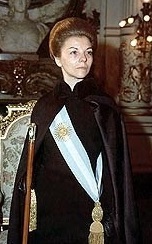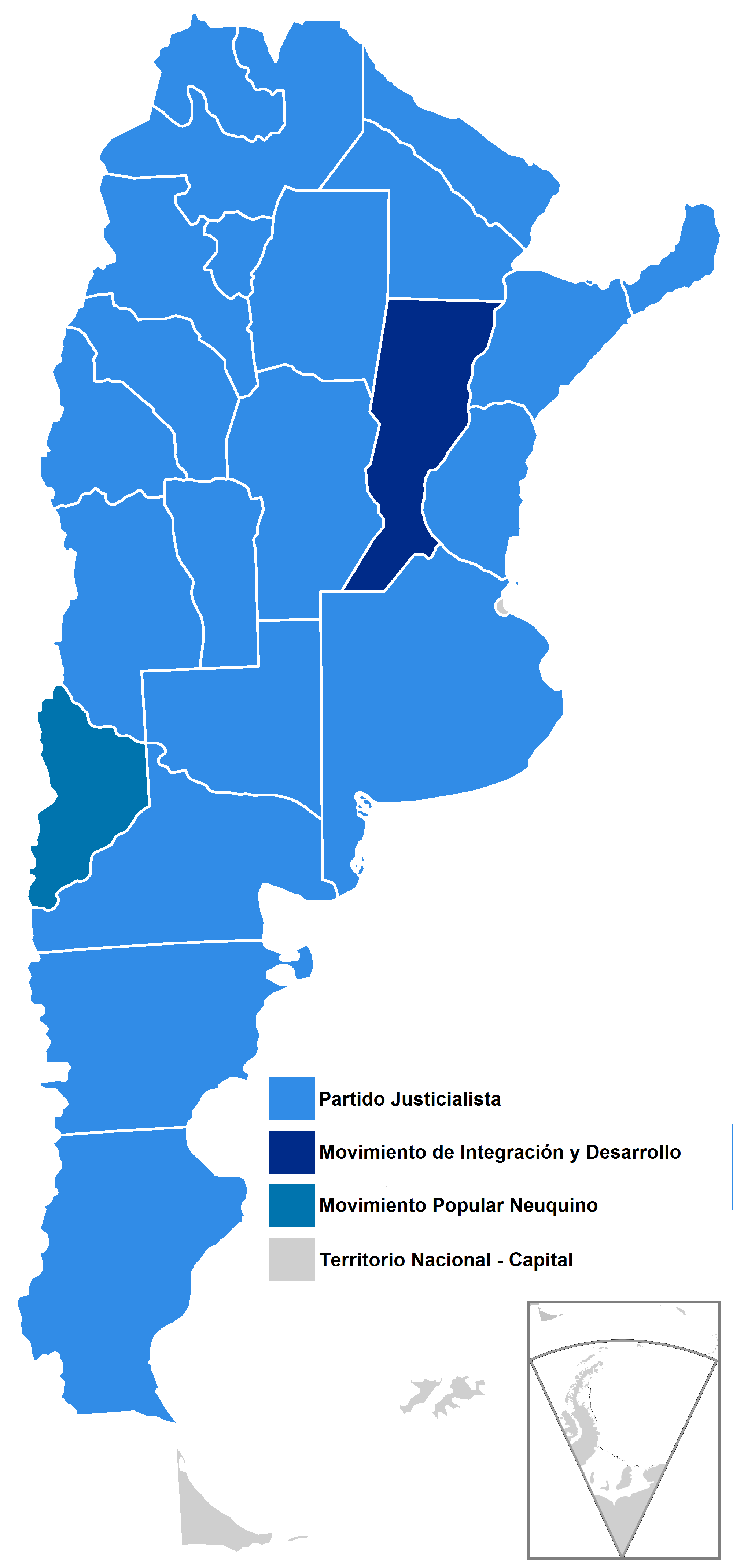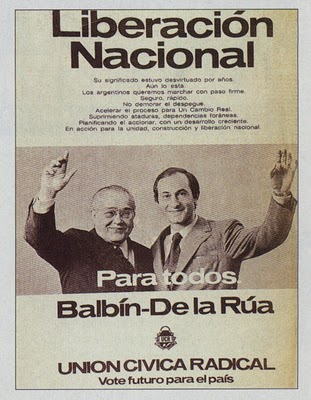|
Antonio Cafiero
Antonio Francisco Cafiero (12 September 1922 – 13 October 2014) was an Argentine Justicialist Party politician. Cafiero held a number of important posts throughout his career, including, most notably, the governorship of Buenos Aires Province from 1987 to 1991, the Cabinet Chief's Office under interim president Eduardo Camaño from 2001 to 2002, and a seat in the Senate of the Nation from 1993 to 2005. Early and personal life Cafiero was born in Buenos Aires. He joined Catholic Action in 1938, and enrolled at the University of Buenos Aires, becoming President of the Students' Association. He graduated as an accountant in 1944, and earned a Doctor in Economic Sciences in 1948, teaching in the discipline as a professor from 1952 to 1984. Cafiero became a militant Peronist from the 17 October 1945 mass demonstrations in support of populist leader Juan Perón, and entered public service in 1952 as Minister of Foreign Trade in the latter's administration, serving until 1954. He ... [...More Info...] [...Related Items...] OR: [Wikipedia] [Google] [Baidu] |
Argentine Senate
The Honorable Senate of the Argentine Nation () is the upper house of the National Congress of Argentina. Overview The National Senate was established by the Argentine Confederation on July 29, 1854, pursuant to Articles 46 to 54 of the 1853 Constitution. There are 72 members: three for each province and three for the Autonomous City of Buenos Aires. The number of senators per province was raised from two to three following the 1994 amendment of the Argentine Constitution as well as the addition of the Autonomous City of Buenos Aires' senators. Those changes took effect following the May 14, 1995, general elections. Senators are elected to six-year terms by direct election on a provincial basis, with the party with the most votes being awarded two of the province's senate seats and the second-place party receiving the third seat. Historically, senators were indirectly elected to nine-year terms by each provincial legislature. These provisions were abolished in the 1994 co ... [...More Info...] [...Related Items...] OR: [Wikipedia] [Google] [Baidu] |
Peronism
Peronism, also known as justicialism, is an Argentine ideology and movement based on the ideas, doctrine and legacy of Juan Perón (1895–1974). It has been an influential movement in 20th- and 21st-century Argentine politics. Since 1946, Peronists have won 10 out of the 14 presidential elections in which they have been allowed to run. Peronism is defined through its three flags: "economic independence" (an economy that does not depend on other countries, by developing its national industry), " social justice" (the fight against socioeconomic inequalities) and " political sovereignty" (the non-interference of foreign powers in domestic affairs). Peronism as an ideology is described as a social form of nationalism, as it pushes for a sense of national pride among Argentines. However, it promotes an inclusive form of nationalism that embraces all ethnicities and races as integral parts of the nation, distinguishing it from racial or chauvinistic ethno-nationalism that prio ... [...More Info...] [...Related Items...] OR: [Wikipedia] [Google] [Baidu] |
Mendoza Province
Mendoza (), officially the Province of Mendoza, is a province of Argentina, in the western central part of the country in the Cuyo region. It borders San Juan to the north, La Pampa and Neuquén to the south, San Luis to the east, and the republic of Chile to the west; the international limit is marked by the Andes mountain range. Its capital city is the homonymous city of Mendoza. Covering an area of 148,827 km2, it is the seventh biggest province of Argentina with 5.35% of the country's total area. The population for 2022 is 2,014,533 inhabitants, which makes it the fifth most populated region of the country, or 4.38% of the total national population. History Pre-Columbian times Archeological studies have determined that the first inhabitants in the area date from the Holocene, but there are few remains of those people to know their habits. The earliest sites of human occupation in Mendoza Province, Agua de la Cueva and Gruta del Indio, are 12,000–13,000 years o ... [...More Info...] [...Related Items...] OR: [Wikipedia] [Google] [Baidu] |
Federal Intervention
Federal intervention () is a power attributed to the federal government of Argentina, by which it takes control of a province in certain extreme cases. Intervention is declared by the President with the assent of the National Congress. Article 6 of the Argentine Constitution states: The federal government intervenes in the territory of the provinces to guarantee the republican form of government or to repel foreign invasions, and upon request of its authorities created to sustain or re-establish them, if they have been deposed by sedition or by the invasion of another province. Upon intervention, the branches of the provincial government are dissolved, and the federal government must appoint a new authority (called ''interventor'') who will serve for a short term until the situation is normalized. The most recent example of intervention took place in 2004, when President Néstor Kirchner applied it in the province of Santiago del Estero after a wave of grave accusations against ... [...More Info...] [...Related Items...] OR: [Wikipedia] [Google] [Baidu] |
Isabel Perón
Isabel Martínez de Perón (, born María Estela Martínez Cartas; 4 February 1931) is an Argentine politician who served as the 41st president of Argentina from 1974 to 1976. She was one of the List of elected and appointed female heads of state and government, first female republican heads of state in the world, and the first woman to serve as President (government title), president of a country. Perón was the third wife of President Juan Perón. During her husband's third term as president from 1973 to 1974, she served as both the 29th List of vice presidents of Argentina, vice president and First Ladies and Gentlemen of Argentina, first lady of Argentina. From 1974 until her resignation in 1985, she was also the second Justicialist Party#Leaders, President of the Justicialist Party. Following her husband's death in office in 1974, she served as President for almost two years before the military took over the government with the 1976 Argentine coup d'état, 1976 coup. Per� ... [...More Info...] [...Related Items...] OR: [Wikipedia] [Google] [Baidu] |
March 1973 Argentine General Election
The first Argentine general election of 1973 was held on 11 March. Voters chose both the President and their legislators. Background The 1966 coup d'état against the moderate President Arturo Illia was carried out largely as a reaction to Illia's decision to honor local and legislative elections in which Peronists, officially banned from political activity following the violent overthrow of President Juan Perón in 1955, did well. Five years later, however, President Alejandro Lanusse found himself heading an unpopular junta, saddled by increasing political violence and an economic wind-down from the prosperous 1960s. Seizing the initiative, he gathered leaders from across the nation's political and intellectual spectrum for a July 1971 ''asado'', a time-honored Argentine custom as much about camaraderie as about steak. The result was Lanusse's "Great National Agreement," a road map to the return to democratic rule, including Peronists (the first such concession the mili ... [...More Info...] [...Related Items...] OR: [Wikipedia] [Google] [Baidu] |
Santiago Cafiero
Santiago Andrés Cafiero (born 30 August 1979) is an Argentine political scientist and politician, currently serving as a Argentine Chamber of Deputies, National Deputy elected in Buenos Aires Province. He previously served as Ministry of Foreign Affairs and Worship, Minister of Foreign Affairs and Worship (2021–2023) and as Chief of the Cabinet of Ministers, Cabinet Chief (2019–2021) in the cabinet of President Alberto Fernández. Early life and education Santiago Andrés Cafiero was born on 30 August 1979 in San Isidro, Buenos Aires, San Isidro, in Buenos Aires Province, son of Juan Pablo Cafiero, who was Ministry of Social Development (Argentina), Minister of Social Development during the presidency of Fernando de la Rúa in 2001, and María Luisa Bianchi. Cafiero's grandfather, Antonio Cafiero, held many important political posts, including the Governor of Buenos Aires Province, governorship of Buenos Aires, and also briefly served as Chief of the Cabinet of Ministers unde ... [...More Info...] [...Related Items...] OR: [Wikipedia] [Google] [Baidu] |
Clarín (Argentine Newspaper)
(, ) is the largest newspaper in Argentina and the second most circulated in the Spanish-speaking world. It was founded by Roberto Noble in 1945, published by the Clarín Group. For many years, its director was Ernestina Herrera de Noble, the founder's wife. is part of ''Periódicos Asociados Latinoamericanos'' ( Latin American Newspaper Association), an organization of fourteen leading newspapers in South America. History was created by Roberto Noble, former minister of the Buenos Aires Province, on 28 August 1945. It was one of the first Argentine newspapers published in tabloid format. It became the highest sold Argentine newspaper in 1965, and the highest sold Spanish-speaking newspaper in 1985. It was also the first Argentine newspaper to sell a magazine with the Sunday edition, since 1967. In 1969, the news were split into several supplements by topic. In 1976, high color printing was benefited by the creation of Artes Gráficas Rioplatense (AGR). For many yea ... [...More Info...] [...Related Items...] OR: [Wikipedia] [Google] [Baidu] |
Fernando De La Rúa
Fernando de la Rúa (15 September 19379 July 2019) served as the President of Argentina from 1999 until his resignation in 2001. A member of the Radical Civic Union, he previously served as national senator for Buenos Aires across non-consecutive terms from 1973 to 1996, national deputy for Buenos Aires from 1991 to 1992, the first Chief of Government of Buenos Aires between 1996 and 1999, and President of the National Committee of the Radical Civic Union from 1997 to 1999. De la Rúa was born in Córdoba, Argentina, Córdoba, and entered politics after graduating with a degree in law. He was elected senator in 1973 and unsuccessfully ran for the office of Vice President as Ricardo Balbín's running mate the same year. He was re-elected senator in 1983 and 1993, and as deputy in 1991. He unsuccessfully opposed the pact of Olivos between President Carlos Menem and party leader Raúl Alfonsín, which enabled the 1994 amendment of the Argentine Constitution and the re-election of M ... [...More Info...] [...Related Items...] OR: [Wikipedia] [Google] [Baidu] |
FrePaSo
The Front for a Country in Solidarity ( or ) was a center-left political coalition in Argentina. Its leading figures were José Octavio Bordón, Carlos "Chacho" Álvarez and Graciela Fernández Meijide. History The coalition was formed in 1994 out of the Broad Front (''Frente Grande''), which had been founded mainly by progressive members of the Peronist Justicialist Party who denounced the neoliberal policies and alleged corruption of the Carlos Menem administration; the Broad Front joined with other dissenting Peronists, the Unidad Socialista ( Popular and Democratic Socialist Party) and several other leftist parties and individuals. Shortly after its foundation, the coalition contested the 1995 elections, with José Octavio Bordón running for president with Carlos "Chacho" Álvarez as running mate. While the coalition didn't win the election, the campaign was considered nonetheless very successful for a newly-formed alliance, as Bordón came second with 29,3% of the ... [...More Info...] [...Related Items...] OR: [Wikipedia] [Google] [Baidu] |
Argentine Chamber Of Deputies
The Chamber of Deputies (), officially the Honorable Chamber of Deputies of the Argentine Nation, is the lower house of the Argentine National Congress (). It is made up of 257 national deputies who are elected in multi-member constituencies corresponding with the territories of the 23 provinces of Argentina (plus the Federal Capital) by party list proportional representation. Elections to the Chamber are held every two years, so that half of its members are up in each election, making it a rare example of staggered elections used in a lower house. The Constitution of Argentina lays out certain attributions that are unique to the Chamber of Deputies. The Chamber holds exclusive rights to levy taxes; to draft troops; and to accuse the president, cabinet ministers, and members of the Supreme Court before the Senate. Additionally, the Chamber of Deputies receives for consideration bills presented by popular initiative. The Chamber of Deputies is presided over by the presi ... [...More Info...] [...Related Items...] OR: [Wikipedia] [Google] [Baidu] |
La Nación
''La Nación'' () is an Argentine daily newspaper. As the country's leading conservative newspaper, ''La Nación''s main competitor is the more liberal ''Clarín (Argentine newspaper), Clarín''. It is regarded as a newspaper of record for Argentina. Its motto is: "''La Nación'' will be a tribune of doctrine." It is the second most read newspaper in print, behind ''Clarín'', and the third in digital format, behind ''Infobae'' and ''Clarín''. In addition, it has an application for Android (operating system), Android and iOS phones. The newspaper's printing plant is in the City of Buenos Aires and its newsroom is in Vicente López, Buenos Aires, Vicente López, Province of Buenos Aires. The newsroom also acts as a studio for the newspaper's TV channel, La Nación +, LN+. Overview The paper was founded on 4 January 1870 (replacing the former publication ''Nación Argentina''), by former Argentine President Bartolomé Mitre and associates. Until 1914, the managing editor was Jo ... [...More Info...] [...Related Items...] OR: [Wikipedia] [Google] [Baidu] |




